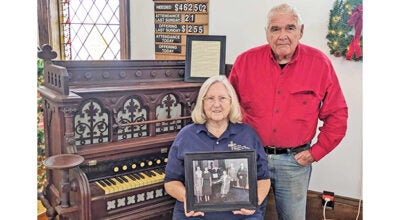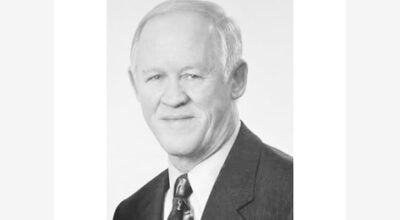Dave Carlock: Touring is key to success
Published 12:26 pm Friday, May 10, 2013
Man, “American Idol” and other contest shows keep getting a bad rap from musicians. It doesn’t surprise me, I’ve never seen an entire episode top to bottom. I can’t stomach it. My sentiments on the series are well echoed by my ex tour mate, Foo Fighters front man Dave Grohl, in this week’s press:
“When I think about kids watching a TV show like “American Idol” or “The Voice,” then they think, ‘Oh, OK, that’s how you become a musician, you stand in line for eight f****** hours with 800 people at a convention center and … then you sing your heart out for someone and then they tell you it’s not f***** good enough. Can you imagine? It’s destroying the next generation of musicians!”
“Musicians should go to a yard sale and buy an old f****** drum set and get in their garage and just suck. And get their friends to come in and they’ll suck, too. And then they’ll f****** start playing and they’ll have the best time they’ve ever had in their lives and then all of a sudden they’ll become Nirvana.
“Because that’s exactly what happened with Nirvana. Just a bunch of guys who had some sh**** old instruments and they got together and started playing some noisy s***, and they became the biggest band in the world.
“That can happen again! You don’t need a f****** computer or the internet or ‘The Voice’ or ‘American Idol.’”
Ya gotta love Dave Grohl. He’s continually setting new records for the highest number of asterisks in a credible news story. But he’s right. The only part where he’s not quite right isn’t in content, but by omission.
There’s a little more to it than that, but that’s where it starts. The real story is that Nirvana may have sucked at the beginning, but the songs were great. The band starved and slept on floors under stages to get from point A to point B. A career as a musician or singer is about the long haul not the short- term contest.
In the music business, you either buy an audience’s attention — like “American Idol” does — or you earn it by incessantly playing and touring. Once you have an audience, you have opportunities to move forward to larger audiences. But there is no elevator ride to the top. It’s hard work, mentally. You have to be willing to forgo all the comforts that most people enjoy growing up in a respectable community. You have to really become an artist, not just dress up like one a few nights a year. There is no elevator to the top. Anyone is foolish to think there is.
When I was growing up, there was no real concept of what it took to be a singer or musician other than the idea of playing and singing in concerts. Unfortunately, a lot of young wanna-bes (and I use the term definitionally rather than accusatorily) don’t even have a strong focus on performing. Ego has always been the main propeller on the entertainment business, but the ego can be satisfied by awards, ribbons, newspaper articles and, over the past two decades: CD releases.
It’s very easy to satisfy the ego with “stuff” rather than “doing the stuff necessary” to succeed in a music career. After sating that driving force that fuels creation and puts the dream into action, nothing happens. Countless times, I’ve seen a talented singer put together a bad recording, pay the money to press it up and then fade into obscurity. They never get beyond a few gigs. No one picked them up in a limo, and they had to move their own gear.
The only way to really become an artist is by touring and performing outside your hometown. As a teenager, I made a splash locally as a whiz kid who was going to go the distance doing one-man shows that featured the latest technology behind my singing and playing. I had a ton of bookings. At age 18, John E.N. Howard (yes, the guy who’s name is all over Berrien County for his philanthropic contributions to the arts) booked me for a summer acoustic gig at the bandshell, which I accepted. A week later, he discovered I was playing the previous week downtown St. Joe and he was a bit miffed for reasons I didn’t understand. Howard called me by phone and asked me: “Haven’t you ever heard of the term overexposure?”
At age 18, I hadn’t. No one was mentoring me or managing me. I thought any gig was a good gig, but there’s so much more to it than that. So many local entertainers never get off the ground because they book show after show in the same town to the point that no one comes to see them beyond their biggest 20 fans. This isn’t good for the band, nor the venue that booked them. I still see bands make the same mistake over and over. The few extra bucks they make is no trade for career growth.
The journey to the top requires you build fanbase through continual shows — but not in the same 10,000-person town. At that point, you’re simply taking the venue’s money and stifling your own growth. Professional performance contracts require that a band not perform without a 45- to 90-mile radius 30 days before and 30 days after a show date. The bigger the band is, the farther the radius. If you’re playing in the same town more often than every six to eight weeks, you’re already sealing your own legacy of fan indifference, and that’s a shame. Your fans love you, but they just won’t come out to see you. To succeed, you need more than their love — you need them to show up. You must tour.
Forget “American Idol.” Forget “The Voice.” Start planning your tour. Get out a map, consult the internet, start putting it together. And remember — if you burn out your audience just because you needed more $$$ that month and booked too many gigs in the same town, you may as well plan on asking for overtime at your day gig, cause you’re about to lose your crowd.
FIND A WAY MY FRIENDS
Dave Carlock is a veteran of the entertainment business whose work as a recording engineer and producer, touring musician, and songwriter made him Googleable. His work as an Independent Content Creator of Sound, Words & Image has earned him a Grammy Award certificate, two Platinum Record Awards and a Paragon Award in advertising. Currently, he brings artists to make records and music videos in the Benton Harbor Arts District.





